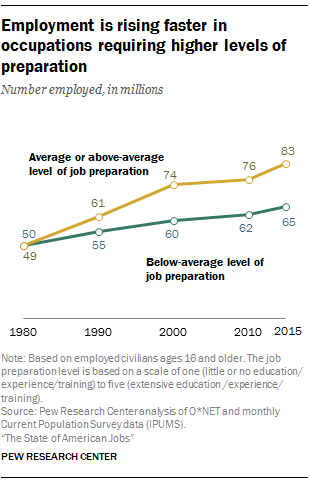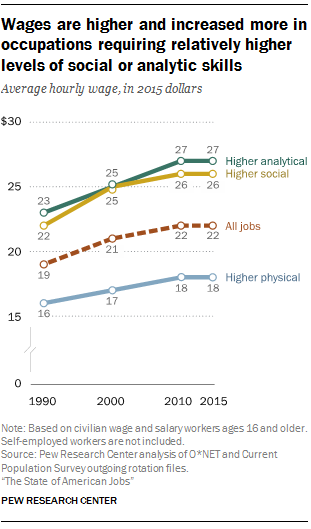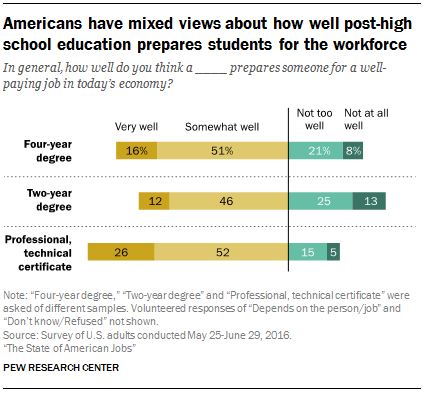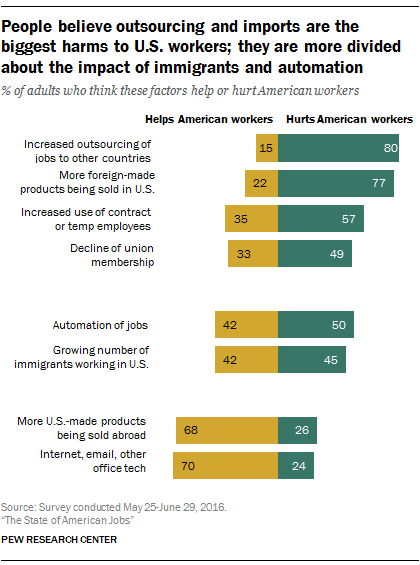
The employment landscape in the U.S. has undergone profound changes, and the public is adapting to the new realities of the workplace and rethinking the skills they need to compete. A new Pew Research Center survey, conducted in association with the Markle Foundation, and analysis of government data finds that employment in occupations requiring more education and training is on the rise, and many workers are realizing that retraining and upgrading their skills needs to be a lifetime commitment.
Here are six key takeaways on the state of American jobs:
Employment has been rising faster in occupations requiring more preparation. As of 2015, some 83 million people worked in jobs that require an average or above average level of preparation (including education, experience and job training), up from 49 million in 1980 – a 68% increase. This was more than double the 31% rise in employment in positions requiring a below average level of job preparation. Employment in these jobs increased from 50 million to 65 million over the same time period.
Employment and wages have increased most in occupations that require higher social or analytical skills. While employment grew by 50% over all occupations from 1980 to 2015, this growth was much higher among jobs that require average or above average social skills (83%), such as interpersonal, management and communication skills, and those that require higher levels of analytical skills (77%), such as critical thinking and computer skills. Meanwhile, employment is up by only 18% in occupations depending more on physical skills such as manual labor, machinery operation or tool manipulation.

Wages have also increased more among jobs requiring higher social or analytical skills. From 1990 to 2015, the average hourly wage for occupations requiring higher levels of analytical skills rose from $23 to $27. Similarly, the mean wage for occupations requiring higher levels of social skills rose from $22 to $26 per hour. By contrast, the mean hourly wage for jobs requiring average or above average physical skills only rose from $16 to $18.
The majority of American workers say they will need continuous training to keep up with changes in the workplace, and many say they do not have the skills they need to get ahead. Some 54% of adults in the labor force say that it will be essential for them to get training and develop new skills throughout their work life in order to keep up with changes in the workplace. An additional one-third say this would be important but not essential. Those with the highest levels of education are the most likely to say this will be essential.
About a third of workers (35%) say they do not currently have the education and training they need to get ahead. Yet many are trying to do something about it: 45% of employed adults report they have pursued extra training to maintain or improve their job skills in the past year.
The public has mixed views on the value of higher education in preparing people for the workplace. Many of those with associate or bachelor’s degrees say their own college experience was very useful for helping them grow personally and intellectually (62%), opening up job opportunities (53%) and providing them with useful job-related skills and knowledge (49%).

But more generally, Americans are somewhat skeptical about the value of a college degree in the job market: Only 16% of all U.S. adults – including 13% of those with at least a four-year college degree – say that a bachelor’s degree prepares students “very well” for a well-paying job in today’s economy, while an additional 51% say it prepares students somewhat well. And 12% say a two-year associate degree prepares students very well (with 46% saying it prepares them somewhat well). About a quarter of Americans (26%) say that certification programs in a professional, technical or vocational field prepares students very well (52% say somewhat well).
Most Americans think the responsibility for making sure the workforce has the right skills and education to be successful in today’s economy lies with individuals themselves. About three-quarters of U.S. adults (72%) say that individuals should bear “a lot” of responsibility for making sure they have the right skills and education to be successful in today’s economy. A somewhat smaller share (60%) says that public K-12 schools should have a lot of responsibility, and still smaller shares say a lot of responsibility should fall on colleges and universities (52%), employers (49%), state governments (40%) or the federal government (35%). Republicans and independents who lean toward the Republican Party are particularly likely to place the emphasis on individuals, while Democrats and Democratic leaners are more likely to place the responsibility on public schools, colleges and the government.

Americans say job security is on the decline, but most workers feel secure in their own jobs. About six-in-ten adults (63%) say the average working person in the U.S. has less job security now than they did 20 or 30 years ago. An additional 19% say job security is about the same as it was then and 16% say there is more job security now. Yet most workers are confident that their own jobs are secure: 88% say they are not too or not at all likely to lose their jobs in the next 12 months.
The public sees threats to workers from multiple fronts. For example, most Americans say that increased outsourcing of jobs to other countries (80%) and more foreign-made products being sold in the U.S. (77%) hurt American workers. Workers see automation as less of a threat. Large majorities see increased use of the internet and other technology in the workplace (70%) and more U.S.-made products being sold abroad (68%) as helping American workers.
